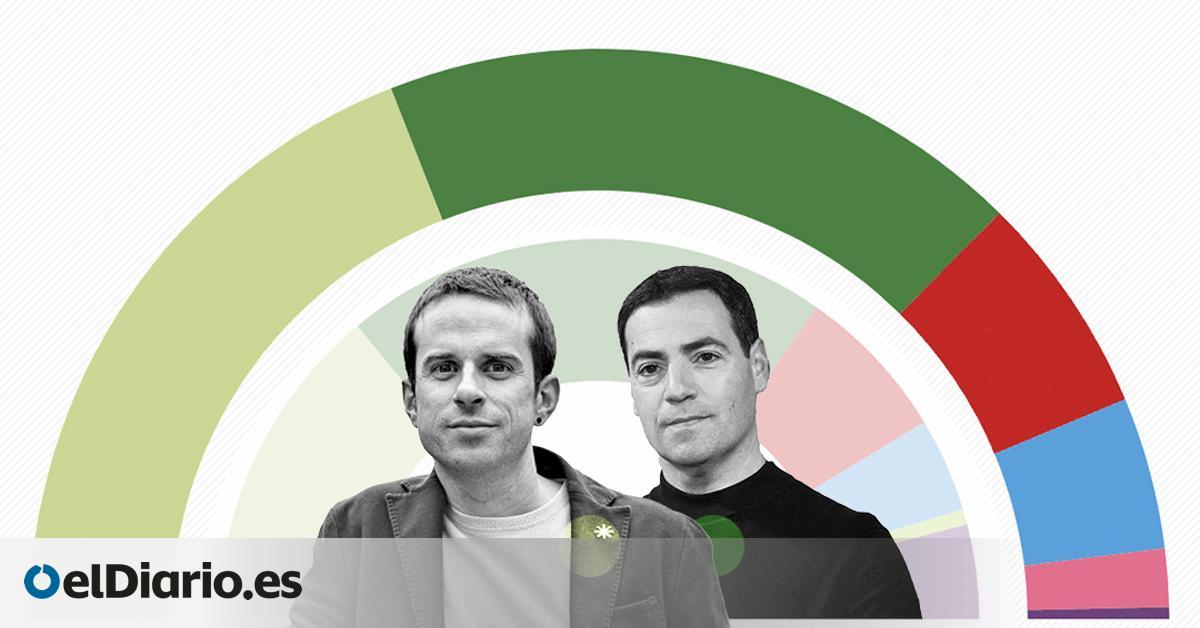
Elections in Euskadi (21A)
Simple Lógica pre-election survey. Majority in 38 seats
Although the forces are very even, EH Bildu is in a position to win the Basque elections of April 21, 2024. In seats and also in votes. That is the conclusion of the Simple Lógica survey for elDiario.es/Euskadi, which gives a slight advantage to Pello Otxandiano over the PNV of Imanol Pradales. Furthermore, the current coalition government of PNV and PSE-EE would be at risk of losing the current absolute majority, since its results range between 36 and 38 seats of the 75 that make up the Basque Parliament. Therefore, at the limit of 38 seats that mark the absolute majority. A very relevant fact: the survey predicts a very low participation, 56%, the scenario most feared by the ‘jeltzales’ in their attempt to mobilize citizens to contain the strong growth of EH Bildu. And another: 18.6% remain undecided.
Euskadi faces the final stretch of the campaign with several polls encouraging the possibility that Otxandiano will be the candidate with the most votes. The PNV has never lost votes in regional elections. And it has only done so six times in sixty elections held in Euskadi since the restoration of democracy, five general and one European, precisely the only time with a first place for the nationalist left, then HB. In terms of seats, it did happen in the 1986 regional elections, when the PSE of Txiki Benegas – without incorporating the EE of the defunct Euskadiko Ezkerra – surpassed the PNV of the recently deceased José Antonio Ardanza by two parliamentarians.
Simple Lógica’s estimate, based on 946 surveys carried out between April 3 and 10, that is, with the campaign already started, grants 34.4% of voting intention to EH Bildu for 33.8% of the PNV. That would translate into 28-29 seats for Otxandiano and 27-28 for Pradales. In the planned direct vote, that is, before the final data cross-check, the advantage for the Abertzale coalition is greater, 22.3% compared to 18.7%. EH Bildu starts with 21 seats in 2020 and the PNV with 31, so the change is evident.
The PSE-EE remains the third force but far from the lead. He won the July 2023 general elections in Euskadi but now has a 12.8% estimated vote (9.8% direct) that could leave him with his current ten seats or even drop him to nine, which was the result of 2016 and the worst data in its history. Eneko Andueza always repeats that the polls underestimate this party and that they will grow. The higher ranges of PNV and PSE-EE would allow the absolute majority of the current Executive to be saved ‘in extremis’, but that cushion could be at risk.
The PP would reach 7.8% of the vote (4.9% direct, a figure similar to that of the CIS) and could obtain six or seven seats. In 2020, in coalition with Ciudadanos, it set a floor of six parliamentarians. The candidacy of Javier de Andrés has not hidden his interest in being “decisive” for governability in the event of EH Bildu’s victory. The ‘popular’ already supported PNV and PSE-EE in the municipal and provincial elections of 2023 where the abertzales prevailed, such as the city councils of Vitoria, Durango and the Provincial Council of Gipuzkoa. To its right, the survey does not give Vox any options to save its seat in Álava.
As for the left, the poll places the combined vote for Sumar and Elkarrekin Podemos-Alianza Verde at 6.6%, with an advantage for the former. The division into two candidates and the need to reach 3% to qualify for seats means that Miren Gorrotxategi’s candidacy can apply for a maximum of one seat for Elkarrekin Podemos-Alianza Verde and that Sumar (with IU and Equo and Alba García Martín in front) has a range of two or three, due to the provincial distribution. Podemos, IU and Equo achieved eleven in 2012 and Podemos and IU six in 2020, to zero for Equo alone.
New and not yet well-known candidates
Citizens also value Otxandiano better than Pradales. Although both approve – they are the only ones who do –, the head of the EH Bildu list receives 5.14 points out of 10 from those surveyed and the person chosen to replace Iñigo Urkullu 5.02. The socialist Andueza has a 4.56; Gorrotxategi, from Elakarrekin, a 4.52; García Martín de Sumar, 4.12; the ‘popular’ De Andrés, a 2.84; and the Vox candidate, Amaia Martínez Grisaleña, a 2.03. In detail, Otxandiano receives a 7.68 among his own and Pradales a 6.78. Socialist voters also approve of Pradales, as do Sumar and Elkarrekin Podemos-Alianza Verde voters of Otxandiano.
Pradales is better known. 72.6% already place him as the new reference of the PNV but there is still a pocket of 20% even among nationalist sympathizers who do not know who he is. In the case of Otxandiano, his knowledge level drops to 60%. There is also a 20% lack of knowledge in their own ranks. 63.1% know Andueza, 59% know De Andrés – who was deputy general of Álava and government delegate –, 57% know Gorrotxategi – parliamentary spokesperson for four years – and only 46% know García Martín.
Datasheet
Regional survey (Euskadi), carried out with a mixed information collection methodology (online and telephone) to a total of 946 individuals with the right to vote. Proportional distribution (sex and age quotas). The error for the global data assuming simple random sampling is +3.3 points, for a confidence level of 95.5%, in the most unfavorable hypothesis (p=q=50%). Interviews were conducted between April 3 and 10, 2024.
Source: www.eldiario.es

